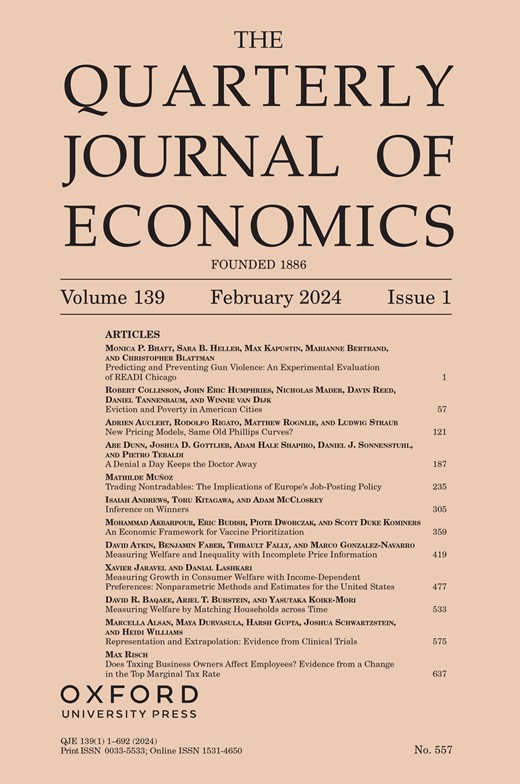Seeing What is Representative
IF 12.7
1区 经济学
Q1 ECONOMICS
引用次数: 2
Abstract
We provide evidence for a bias that we call “representative signal distortion” (RSD) which is particularly relevant to settings of statistical discrimination. Experimental subjects distort their evaluation of new evidence on individual group members and interpret such information to be more representative of the group to which the individual belongs (relative to a reference group) than it really is. This produces a discriminatory gap in the evaluation of members of the two groups. Because it is driven by representativeness, the bias (and the discriminatory gap) disappears when subjects are prevented from contrasting different groups; because it is a bias in the interpretation of information, it disappears when subjects receive information before learning of the individual’s group. We show that this bias can be easily estimated from appropriately constructed datasets and can be distinguished from previously documented inferential biases in the literature. Importantly, we document how removing the bias produces a kind of free lunch in reducing discrimination, making it possible to significantly reduce discrimination without lowering accuracy of inferences.看到什么是有代表性的
我们为一种偏差提供证据,我们称之为“代表性信号失真”(RSD),这与统计歧视的设置特别相关。实验对象歪曲了他们对个别小组成员的新证据的评价,并将这些信息解释为比实际情况更能代表个人所属的小组(相对于参考小组)。这就造成了对这两个群体成员的评价存在歧视性差距。因为它是由代表性驱动的,当受试者被阻止对比不同的群体时,偏见(和歧视性差距)就会消失;因为这是对信息解释的一种偏见,所以当被试在了解个体所在群体之前接受信息时,这种偏见就会消失。我们表明,这种偏差可以很容易地从适当构建的数据集中估计出来,并且可以与文献中先前记录的推断偏差区分开来。重要的是,我们记录了消除偏见如何在减少歧视方面产生一种免费的午餐,使得在不降低推理准确性的情况下显著减少歧视成为可能。
本文章由计算机程序翻译,如有差异,请以英文原文为准。
求助全文
约1分钟内获得全文
求助全文
来源期刊

Quarterly Journal of Economics
ECONOMICS-
CiteScore
24.20
自引率
2.20%
发文量
42
期刊介绍:
The Quarterly Journal of Economics stands as the oldest professional journal of economics in the English language. Published under the editorial guidance of Harvard University's Department of Economics, it comprehensively covers all aspects of the field. Esteemed by professional and academic economists as well as students worldwide, QJE holds unparalleled value in the economic discourse.
 求助内容:
求助内容: 应助结果提醒方式:
应助结果提醒方式:


